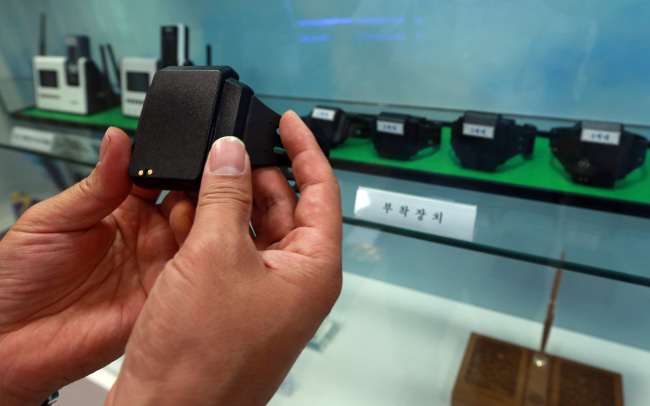In the six years since Korea started fitting electronic tags on convicted sex offenders, the rate at which criminals reoffend has dropped, the Justice Ministry says.
According to the ministry, around 15 percent of sex offenders committed similar crimes again between 2006 and 2008, but the rate sharply dropped to below 2 percent after the use of tracking devices was adopted in September 2008.
Child kidnappers and murderers were added to the list of criminals subject to the measure in 2009 and 2010, respectively.
But questions continue to be raised about the efficacy of the system and the credibility of the government data. Some observers argue that the system has not been sufficient in preventing repeat offenses and triggered a dispute over human rights infringement.
But the ministry refuted the skeptical view of the cons, saying that polls show the majority of citizens are in favor of the tracking system.
According to the ministry, around 15 percent of sex offenders committed similar crimes again between 2006 and 2008, but the rate sharply dropped to below 2 percent after the use of tracking devices was adopted in September 2008.
Child kidnappers and murderers were added to the list of criminals subject to the measure in 2009 and 2010, respectively.
But questions continue to be raised about the efficacy of the system and the credibility of the government data. Some observers argue that the system has not been sufficient in preventing repeat offenses and triggered a dispute over human rights infringement.
But the ministry refuted the skeptical view of the cons, saying that polls show the majority of citizens are in favor of the tracking system.

On the back of the dominant pros, the ministry has decided to widen the scope of the anklet system to those convicted of robbery. It will be implemented on June 19.
The targets are robbery convicts who reoffend within 10 years of their imprisonment or those who habitually engaged in the crime, irrespective of the imprisonment sentence.
“Compared to other types of criminals, robbers are more likely to repeat their crimes. Additionally, they have the potential to commit more brutal offenses such as murder and rape. We need effective preventive measures to discourage them from continuing to engage in illicit acts,” said a Justice Ministry official.
He cited the data that showed that nearly 28 percent of people convicted of robbery are repeat offenders after being released from prison, higher than murderers at 10.2 percent and rapists at 14.8 percent.
However, civic groups and human rights activists are again set to protest the ministry’s latest move, saying it excessively restricts an individual’s privacy.
In recent months, several ex-convicts wearing the anklets took their own lives out of frustration that they were unable to carry on with everyday life because of the device.
Opponents also share the view that society needs to monitor rapists and kidnappers to prevent them from repeating their crimes.
“But subjecting robbers to the same punishment seems to be too harsh. The real problem is that judicial policymakers should have first listened to public opinion on the matter. But they didn’t,” said a spokesman for the People’s Solidarity for Participatory Democracy.
He said robbery was not as serious as child abduction, murder or sexual assault, stressing that the government should be more considerate of the well-being of ex-convicts after they are released from correctional facilities.
(kys@heraldcorp.com)



![[Exclusive] Korean military set to ban iPhones over 'security' concerns](http://res.heraldm.com/phpwas/restmb_idxmake.php?idx=644&simg=/content/image/2024/04/23/20240423050599_0.jpg&u=20240423183955)
![[AtoZ into Korean mind] Humor in Korea: Navigating the line between what's funny and not](http://res.heraldm.com/phpwas/restmb_idxmake.php?idx=644&simg=/content/image/2024/04/22/20240422050642_0.jpg&u=)

![[Graphic News] 77% of young Koreans still financially dependent](http://res.heraldm.com/phpwas/restmb_idxmake.php?idx=644&simg=/content/image/2024/04/22/20240422050762_0.gif&u=)




![[Pressure points] Leggings in public: Fashion statement or social faux pas?](http://res.heraldm.com/phpwas/restmb_idxmake.php?idx=644&simg=/content/image/2024/04/23/20240423050669_0.jpg&u=)







